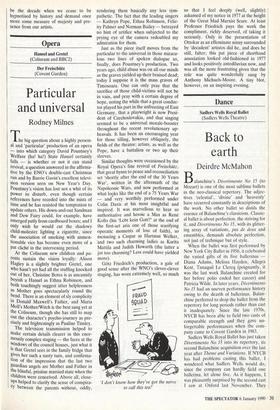Opera
Hansel and Gretel (Coliseum and BBC2) Der FreischUtz (Covent Garden)
Particular and universal
Rodney Milnes
The big question about a highly person- al and 'particular' production of an opera --- into which category David Pountney's Welfare (ha! ha!) State Hansel certainly falls — is whether or not it can stand revival, a question answered in the affirma- tive by the ENO's double-cast Christmas run and by Barrie Gavin's excellent televi- sion version seen on New Year's Day. Pountney's vision has lost not a whit of its power to disturb, even though certain references have receded into the mists of time and he has resisted the temptation to update others. His down-and-out Sandman and Dew Fairy could, for example, have emerged patly from cardboard boxes; and I Only wish he would cut the shadowy child-molester lighting a cigarette, since the association of smoking with unmen- tionable vice has become even more of a pat cliche in the intervening period.
At the Coliseum new children and pa- rents sustain the vision loyally: Alison liagley is a slightly brighter Gretel, one who hasn't yet had all the stuffing knocked out of her, Christine Bates is as uncannily boyish a Hansel as Ethna Robinson, and both touchingly suggest utter helplessness as Mother goes spectacularly round the bend. There is an element of sly complicity in Donald Maxwell's Father, and Maria Moll's Mother/Witch is the best sung yet at the Coliseum, though she has still to map out the character's psycho-journey as pre- cisely and frighteningly as Pauline Tinsley.
The television transmission helped to make certain details clearer in this enor- mously complex staging — the faces at the Windows of the council houses, just what it is that Gretel sees in the family fridge that gives her such a nasty turn, and confirma- tion of the impression that the last two guardian angels are Mother and Father in the blissful, pristine married state when the children were conceived. Above all, close- ups helped to clarify the sense of conspira- cy between the parents without, oddly,
rendering them basically any less sym- pathetic. The fact that the leading singers — Kathryn Pope, Ethna Robinson, Felic- ity Palmer and Norman Bailey — betrayed no hint of artifice when subjected to the prying eye of the camera redoubled my admiration for them.
Just as the piece itself moves from the particular to the universal in those miracu- lous two lines of spoken dialogue so, finally, does Pountney's production. Two years ago, child abuse was on all our minds as the graves yielded up their bruised dead; today I suppose it is the mass graves of Timosoara. One can only pray that the sacrifice of those child-victims will not be in vain,• and pray with a certain degree of hope, noting the while that a great conduc- tor played his part in the unfreezing of East Germany, that a playwright is now Presi- dent of Czechoslovakia, and that singing seemed to be a universal morale-booster throughout the recent revolutionary up- heavals. It has been an encouraging year for those tilling, however obliquely, the fields of the theatre: artists, as well as the Pope, have a battalion or two up their sleeves.
Similar thoughts were occasioned by the Royal Opera's fine revival of Freischiitz, that great hymn to peace and reconciliation set `shortly after the end of the 30 Years War', written in the aftermath of the Napoleonic Wars, and now performed at what looks like the end of a 75 Years War — and' very worthily performed under Colin Davis at his most insightful and inspired. It was marvellous to hear so authoritative and heroic a Max as Rene Kollo (his `Lebt kein Gott?' at the end of the first-act aria one of those scarifying operatic moments of loss of faith), so menacing a Caspar as Hartmut Welker, and two such charming ladies as Karita Mattila and Judith Howarth (the latter a jot too charming? Less could have yielded more).
Getz Friedrich's production, a gale of good sense after the WNO's clever-clever staging, has worn extremely well, so much '1 don't know how they've got the nerve to call this tea!' so that I feel deeply (well, slightly) ashamed of my notice in 1977 at the height of the Great Mad Marxist Scare. At least Professor Friedrich pays the work the compliment, richly deserved, of taking it seriously. Only in the presentation of Ottokar as an effeminate ninny surrounded by `decadent' artistos did he, and does he still, falter; this pat piece of shorthand association looked old-fashioned in 1977 and looks positively antediluvian now, and was all the more frustrating given that the role was quite wonderfully sung by Anthony Michaels-Moore. A tiny blot, however, on an inspiring evening.










































 Previous page
Previous page